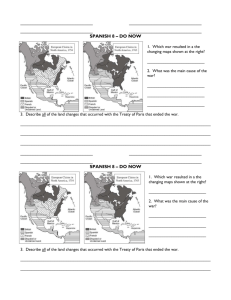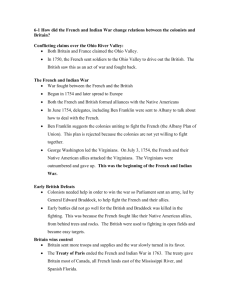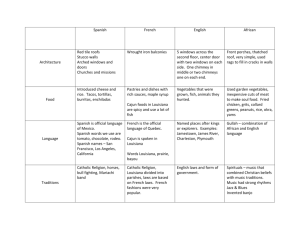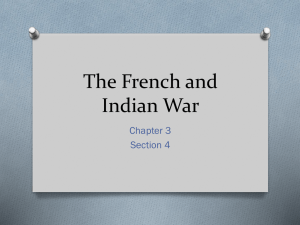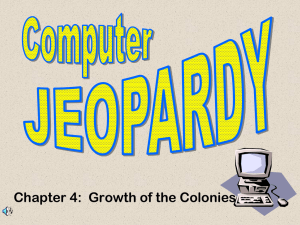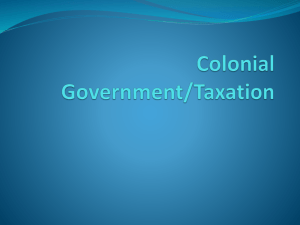Chapter 4 - SchoolNotes
advertisement
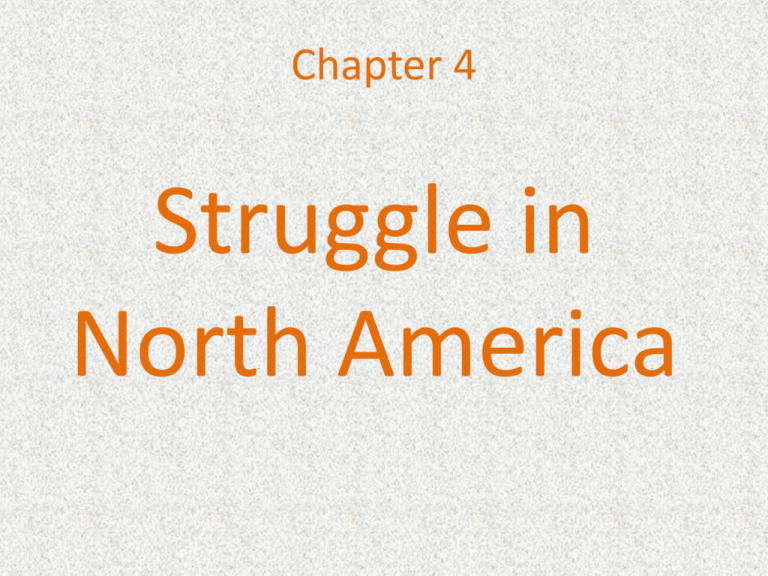
Chapter 4 Struggle in North America French and Indian War • • • • • • • when the war took place another name for the war how long the war lasted why the war started treaties that took place during this war what the treaties accomplished who won the war Lesson 1 Vocabulary Treaty: an agreement between nations Ancestor: a relative that was born a long time ago. Creole: someone in Louisiana whose ancestors were French and Spanish Timeline Activity • In Groups Place the Events on the timeline activity in the order that they happened. • Create a timeline with the dates and events in the correct order. • Make sure that your timeline contains a title and your group number Summary: The French and Indian War • Silently Read the Passage that says War in North America • Underline the sentence that tells why the French and Indian War took place. • Underline the word treaty in the passage. Review in Groups • • • • • • • 1. What other name is The French and Indian war called? 2. When did the French and Indian War begin? 3. When did the French and Indian War end? 4. What treaty did France and Spain sign in 1762? 5. What did this treaty do for Spain? 6. Why did the French and Indian War take place? 7. After the French and Indian War where did many people move? • 8. How many years did the French and Indian War last? • 9. What treaty ended the French and Indian War? • 10. How many colonies did Britain divide Florida into after French and Indian War? French and Indian War • • • • • • • when the war took place another name for the war how long the war lasted why the war started treaties that took place during this war what the treaties accomplished who won the war Spanish Louisiana • Many different kinds of people lived in Spanish Louisiana. • Louisiana's population grew at a rapid rate. • French and Spanish settlers soon began to share a common culture • Today, many people in Louisiana have ancestors who were French and Spanish settlers • Many people in Louisiana became known as Creoles. • Some Creoles also have African ancestors • Louisiana had a large African population when Spain took over. • Maroons lived in the swamps of Louisiana because they did not want to be captured. • Acadians also came from Canada to live in Spanish Louisiana. • The Acadians later became known as Cajuns. Lesson Timeline Review 1754: French and Indian War began. 1762: Treaty of Fontainebleau 1763: Britain wins the French and Indian War Lesson 2 Vocabulary Tax: money that people or businesses must pay to the government Declaration: a statement that announces an idea Independence: freedom from rule by someone else. Liberty: freedom A New Nation is Born • Defending the colonies in the French and Indian war cost a lot of money. • The British thought the colonist should pay. • 1760’s: British passed laws that made the American colonist pay more taxes. • Many Colonists thought these taxes were unfair. • 1774 Colonists met in the First Continental Congress where they discussed ways to make Britain treat them fairly • The colonists sent suggestions to the king of England. • The king sent troops to control the colonists. • The colonists organized an army led by George Washington and the fighting began. Declaration of Independence • 1776: colonists approved the Declaration of Indolence • Thomas Jefferson wrote the declaration. • It said that American colonies were free from Britain’s rule • West Florida did not want independence • The people who stayed loyal to Britain were called loyalists. • The people who wanted independence were called Patriots. Revolutionary War • 1779- Spain entered war against Britain • Spanish leaders wanted to control all of West Florida • Galvez attacked the British and won control of Natchez and Pensacola. • The British lost this war. • 1783: The treaty of Paris gave liberty to American colonies. • Britain gave West Florida back to Spain. A New Government • The Constitution was a written plan for the government of the new nation. • After the American Revolution the 13 colonies became independent states. • The new states agreed to join together and write a plan for a national government called the Articles of Confederation. • The constitution set up a federal system which explained the laws and decisions the federal or national government can make. • The Bill of rights is 10 amendments to the Constitution. Chapter 4 Review and Test Prep Visual Summary 1. 2. 3. The Treaty of Paris ended the French and Indian War and divided the land in North America between France, Britain, and Spain. Louisiana became a Spanish colony when the French gave it to Spain in 1762. The Constitution is a plan for the government of the United States. It sets up a federal form of government in which the central government shares power with the states. Facts and Main Ideas 4. 5. 6. 7. 8. Both France and Great Britain wanted to control the land of North America. France wanted to keep the British from taking over Louisiana. Escaped slaves Delegates discussed ways to make Great Britain treat the American colonies fairly. They sent suggestions to the king. A federal form of government in which the central government shares powers with the states. Chapter 4 Review and Test Prep Vocabulary 9. Independence 10. Ancestor 11. Tax Apply Skills 12. C 13. A Critical Thinking 14. In Spanish Louisiana fewer people spoke English. The different cultures of Louisiana were blending together. The people were ruled by the king of Spain, and some of them were slaves. There was no democracy. People at that time did not have the technology we depend on today. Chapter 4 Review and Test Prep Critical Thinking Continued 15. Spain entered the war against Britain and helped the colonists win. Timeline 16. 1754 ****Questions to Ponder*******(Very Important for the Test) 1. What was the effect of the French and Indian War on Great Britain? 2. Explain why the independent states wrote the Constitution when they already had the Articles of Confederation.
